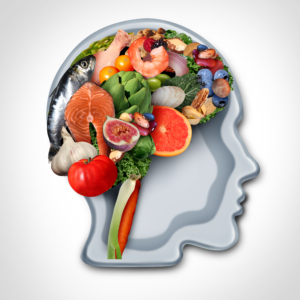How Diet Affects the Brain, Long Island Dietitian Discusses Brain Health & Nutrition
How Diet Affects the Brain and Neurological Diseases – A Long Island Dietitian Discusses Brain Health and Nutrition
Dementia and other neurodegenerative diseases are on the rise, highlighting the urgent need for effective, preventive strategies that focus on modifiable risk factors. Nutrition plays a vital role in the onset and progression of both inflammation and cognitive decline. Research shows that the right dietary approach can reduce the risk of future cognitive impairment and help slow the progression of conditions such as Alzheimer’s disease and Parkinson’s disease.
As a dietitian nutritionist on Long Island, I work closely with patients to prevent or delay the progression of these conditions through personalized, evidence-based nutrition plans.
What is the Science Behind Food Selections and Both Cognitive Decline and Neurodegenerative Diseases?
The foods you eat have a direct effect on brain health and your risk for neurological disorders. The brain depends on a constant supply of key nutrients, which serve multiple critical functions, including:
- Fuel for brain activity
- Nutrient building blocks for neurotransmitters
- Modulating inflammation in the brain
- Reducing oxidative stress
Together, these functions help maintain optimal brain performance and may reduce your risk of neurodegenerative diseases.
What is the Science Behind the Microbiome and Both Cognitive Decline and Neurological Disease?
Emerging research underscores the important link between gut health and brain function. The gut microbiome—the community of microorganisms living in your digestive tract—can influence mood, cognition, and neurological disease risk.
Over the past decade, research has shown that the gut microbiome may play a key role in the development of neurological disorders such as Alzheimer’s, Parkinson’s, multiple sclerosis, and even stroke. The gut communicates with the brain through what’s known as the gut-brain axis, influencing neurological function through direct metabolites or indirectly through immune and hormonal pathways.
In addition, recent publications have highlighted that an imbalance in gut flora, known as dysbiosis, has been associated with increased inflammation and a higher risk of cognitive decline. Supporting a healthy microbiome through dietary choices is a promising area of preventive care.
Should you Focus on Nutrients, Individual Foods, or Dietary Patterns?
In the past, nutrition recommendations focused heavily on single foods and individual nutrients, recommending a greater consumption of health-promoting foods and a limited intake of unhealthy options. While these still matter, research now emphasizes the greater impact of overall dietary patterns—the combination, variety, and frequency of foods habitually consumed.
That’s because foods don’t act in isolation. Nutrients and compounds in foods interact synergistically, influencing health outcomes in more powerful ways than any single food or supplement can.
Macronutrients (carbohydrates, protein, and fat), micronutrients (vitamins, minerals, botanicals), and phytochemicals all play roles—but it’s your overall dietary pattern that creates the foundation for brain health.
What is the Best Diet to Prevent Alzheimer’s, Dementia, and Cognitive Decline?
In an effort to slow the progression of cognitive impairment, researchers have studied the efficacy of several diets in randomized controlled trials, including:
- The Mediterranean Diet
- The DASH Diet (Dietary Approaches to Stop Hypertension)
- The MIND Diet (Mediterranean-DASH Intervention for Neurodegenerative Delay)
- The Ketogenic Diet
The MIND Diet has been shown to delay or potentially prevent the onset of dementia. Similarly, the Mediterranean pattern provides anti-inflammatory foods that can help support cognitive health.
The Components of the MIND Diet
The traditional MEDITERRANEAN dietary pattern includes mainly whole, minimally processed plant foods, including cereal grains, legumes, vegetables, fruit, nuts, and fish, with small amounts of meat, milk, and dairy products, and a regular modest amount of alcohol.
The DASH diet emphasizes fruit, vegetables, and low-fat dairy products and includes whole grains, poultry, fish, nuts, and is reduced in fats, red meat, sweets, and sugar-containing beverages.
Combining the two diets, the MIND diet emphasizes natural, plant-based foods, specifically promoting an increase in the consumption of berries and green leafy vegetables, with limited intake of animal-based and high saturated fat foods.
Brain-healthy foods include:
- Green leafy vegetables
- Other vegetables
- Nuts
- Berries
- Beans
- Whole grains
- Fish
- Poultry
- Olive oil
- Wine (in moderation)
Foods to limit:
- Red meat
- Butter and stick margarine
- Cheese
- Pastries and sweets
- Fried or fast food
This pattern encourages natural, plant-based foods and prioritizes antioxidant-rich ingredients like berries and leafy greens—both shown to support cognitive function.
Nutrition Care for Patients with Dementia
Registered dietitians are specially trained in medical nutrition therapy, allowing them to assess, plan, and implement tailored nutrition care for individuals with cognitive decline or neurodegenerative diseases.
As a dietitian-nutritionist, I provide online nutrition therapy, working with patients and their caregivers, when appropriate, to create enjoyable, structured eating experiences that align with each patient’s medical needs, lifestyle, and food preferences. Through ongoing support, we adapt the plan as the patient’s condition evolves, always focusing on quality of life and dignity.
Further Reading:
The Gut Microbiome in Neurological Disorders



